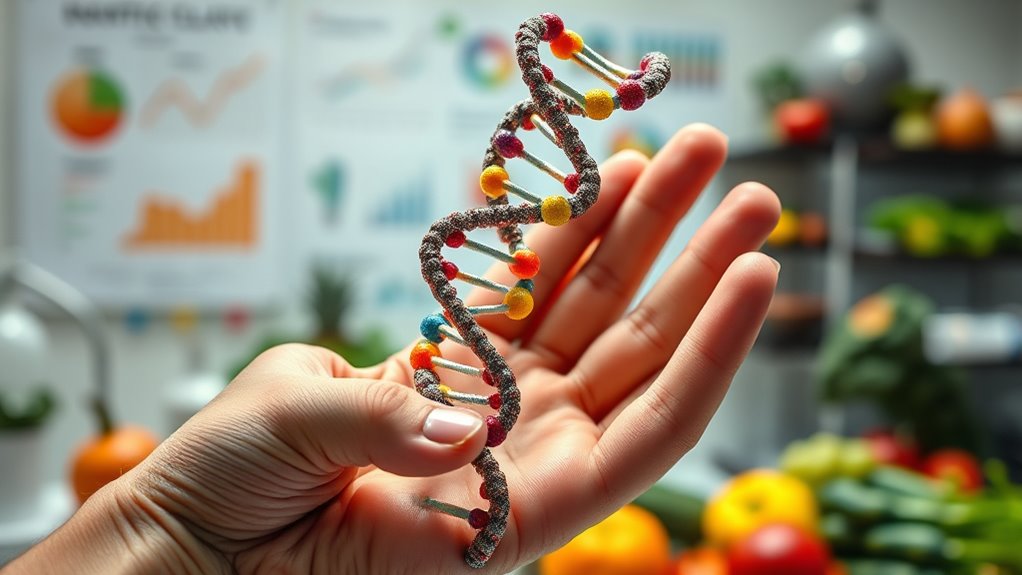Nutrigenomics shows how your genes directly influence your nutrient needs and how you respond to different diets. Your genetic variations affect how your body absorbs, processes, and utilizes nutrients, meaning a one-size-fits-all approach may not work well for you. Advances in genetic testing now make it easier to identify these differences. Staying informed can help you optimize your health through personalized nutrition—if you keep exploring, you’ll discover even more ways your genes shape your diet.
Key Takeaways
- Nutrigenomics studies how individual genetic variations affect nutrient absorption, metabolism, and overall dietary responses.
- Genes influence the production of enzymes necessary for digesting and utilizing specific nutrients.
- Genetic testing can identify variants like MTHFR or APOE that impact nutrient needs and health risks.
- Personalized nutrition plans use genetic information to optimize diet effectiveness and prevent deficiencies.
- Advances in technology make genetic-based dietary recommendations more accessible, accurate, and tailored to individual needs.
The Basics of Nutrigenomics and Its Significance
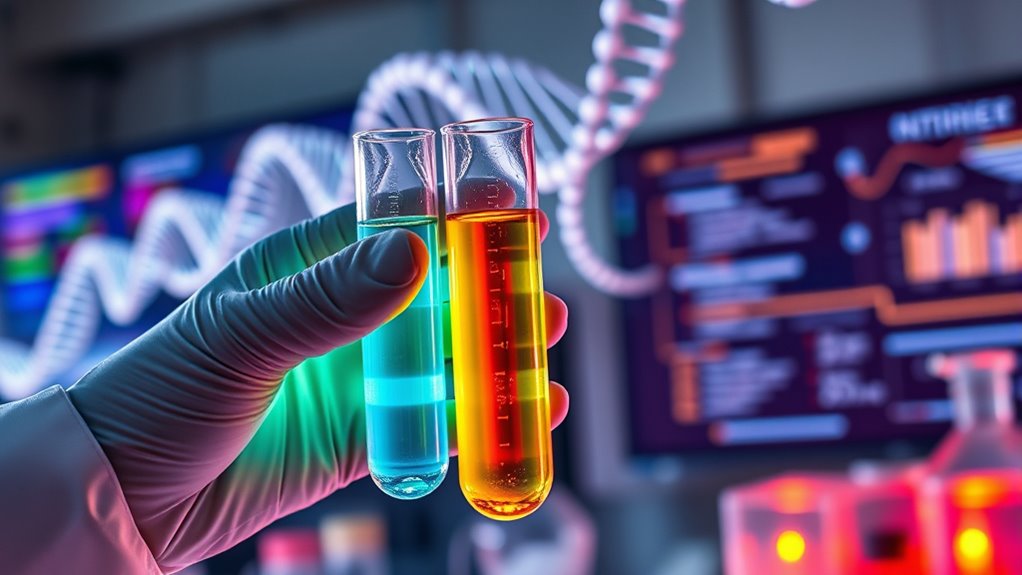
Nutrigenomics is a rapidly growing field that explores how your genes influence your response to different nutrients and diets. Your genetic predispositions can affect how well your body absorbs and utilizes nutrients, making personalized nutrition essential. For example, some people have genetic variations that impact nutrient absorption, leading to deficiencies even with a balanced diet. Understanding these genetic factors helps you identify your unique nutritional needs and optimize your health. By knowing how your genes interact with specific foods, you can make smarter choices to improve overall wellness. This field emphasizes that nutrition isn’t one-size-fits-all; it’s tailored to your genetic makeup. Recognizing your genetic predispositions allows you to focus on strategies that enhance nutrient absorption and promote better health outcomes. Additionally, nutrient absorption can be affected by your body’s efficiency, which varies based on genetic factors, highlighting the importance of personalized nutrition plans. Moreover, advances in genetic testing are making it easier to identify specific nutrient-related gene variations that influence your dietary requirements.
How Genes Affect Nutrient Metabolism
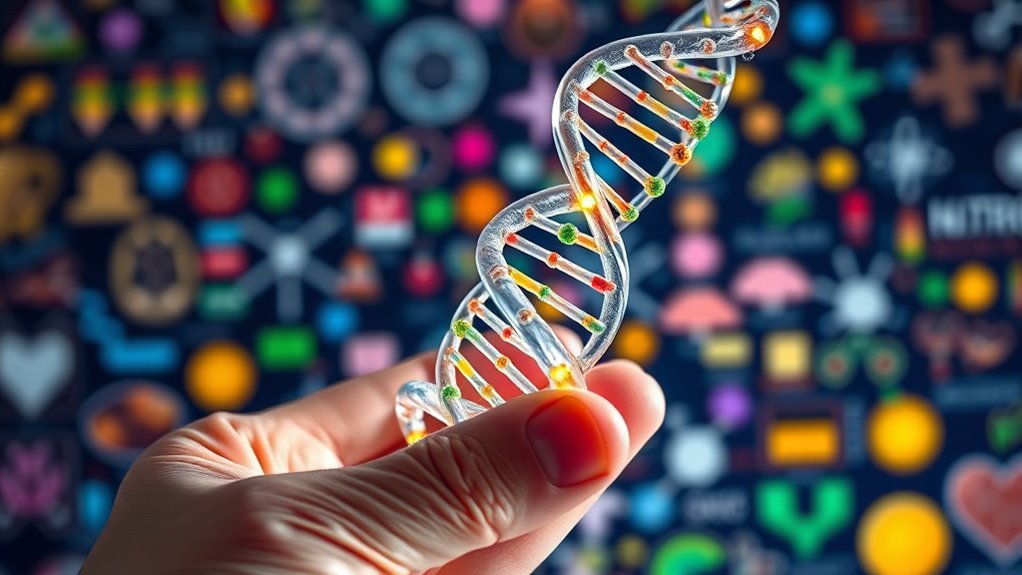
Genes play a crucial role in determining how your body processes and utilizes nutrients. Your gene expression influences the production of enzymes essential for digesting and metabolizing different nutrients, directly affecting your nutritional needs. For example, some people efficiently convert folate, while others may struggle due to genetic differences. Nutritional epigenetics explores how environmental factors, like diet, can modify gene expression without changing DNA sequences, impacting nutrient metabolism. These epigenetic changes can enhance or hinder your body’s ability to absorb, utilize, or excrete nutrients. Understanding how genes influence these processes helps explain why individuals respond differently to the same diet. Additionally, knowledge of best anime movies can provide a relaxing escape that supports overall well-being, which is an important aspect of holistic health. Recognizing how genetic variations influence nutrient absorption and metabolism enables personalized nutrition strategies, optimizing health outcomes. By understanding gene expression and its impact on metabolism, you can tailor your nutrition to optimize nutrient absorption and overall health.
Key Genetic Variants Influencing Dietary Needs
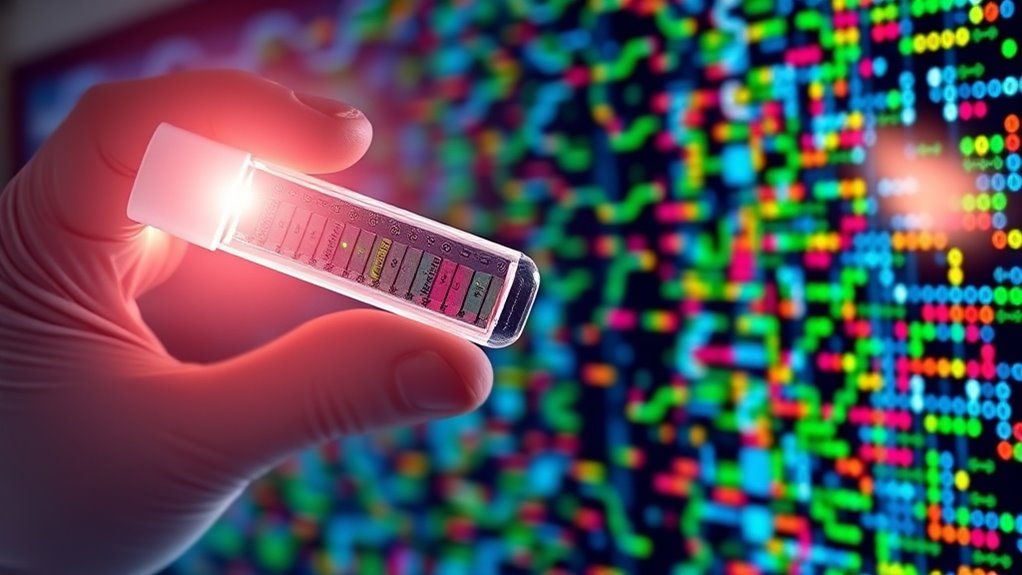
Your genetic makeup can profoundly influence how your body responds to particular nutrients, affecting your dietary needs. Specific genetic markers help identify these variations, offering insights into your unique nutritional requirements. For example, variants in genes like MTHFR can impact folate metabolism, while others in the APOE gene influence lipid processing, affecting your cholesterol levels. These key genetic variants often correlate with certain dietary patterns, guiding personalized recommendations. Recognizing these genetic markers allows you to tailor your diet to optimize health and prevent deficiencies or diseases. Additionally, understanding currency fluctuations can help you plan your nutrition-related expenses better, especially if you are managing a global diet or purchasing specialty foods internationally. This knowledge extends to understanding AI’s role in healthcare diagnostics, which is improving the precision of nutritional assessments and interventions. By understanding your genetic predispositions, you can make informed choices about nutrient intake, aligning your diet with your genetic profile for better overall wellness. This approach empowers you to move beyond generic guidelines toward more precise, effective nutrition strategies.
The Role of Nutrigenomics in Personalized Nutrition

Your genetic makeup influences how your body responds to different nutrients, making personalized recommendations essential. Nutrigenomics helps identify these variations, allowing tailored diets that optimize health. As testing advances, the future of personalized nutrition will become more accurate and accessible for everyone. Additionally, advancements in AI technology, such as intelligent tutoring systems, are enhancing education by providing personalized learning experiences that can support health literacy and nutritional education. Incorporating genetic testing into dietary planning can further improve the effectiveness of tailored nutrition strategies, especially as understanding of nutrient needs based on genetic variations continues to grow.
Genetic Variations Impacting Diet
Genetic variations play a crucial role in determining how you respond to different foods and nutrients. These variations, including genetic mutations, influence absorption, metabolism, and utilization of nutrients, affecting your health and wellness. Recognizing these differences allows for diet customization, ensuring you get what your body needs. For example, some people have genetic mutations that make them less efficient at processing caffeine or lactose. This knowledge helps tailor dietary choices to prevent adverse effects and optimize health benefits. Here’s a visual overview:
| Genetic Variation | Impact on Diet | Resulting Action |
|---|---|---|
| Lactose mutation | Lactose intolerance | Limit dairy intake |
| MTHFR mutation | Folate metabolism issues | Adjust folate sources |
| Caffeine gene | Caffeine sensitivity | Moderate caffeine consumption |
| Vitamin D receptor | Vitamin D absorption efficiency | Supplement or sun exposure |
Additionally, understanding nutrient absorption can help identify individual needs for supplementation or dietary adjustments, especially when considering personalized nutrition strategies.
Personalized Nutrient Recommendations
Nutrigenomics enables tailored nutrient recommendations by analyzing individual genetic profiles, ensuring that dietary plans align with each person’s unique biological makeup. Your genetic predispositions influence how your body absorbs and processes nutrients, which can lead to nutritional imbalances if ignored. By understanding these genetic factors, your healthcare provider can recommend specific nutrients or supplements to address your unique needs. This personalized approach helps prevent deficiencies and reduces the risk of chronic diseases linked to poor nutrition. Instead of generic guidelines, your diet becomes a precise plan designed around your genetic makeup. Additionally, awareness of vetted Mother Baby Kids products can guide you in choosing safe and effective nutritional support options. Recognizing the importance of merchant services can also facilitate easier access to nutritional supplements and support your health journey. Overall, nutrigenomics empowers you to optimize your health by targeting nutritional imbalances rooted in your genetics, making your diet more effective and aligned with your biology. Incorporating glycolic acid products can enhance skin health and complement your personalized nutrition plan, supporting overall wellness.
Future of Nutrigenomic Testing
Advancements in genetic testing technology are paving the way for more accessible and all-encompassing nutrigenomic assessments. Soon, you’ll be able to identify your genetic predispositions more accurately, helping tailor your diet to your unique needs. Improved testing methods will also analyze nutritional biomarkers more precisely, giving clearer insights into how your body responds to specific nutrients. This progress means personalized nutrition plans will become increasingly detailed and effective. You’ll be empowered to make smarter choices based on your genetic profile, optimizing your health and preventing nutrient deficiencies. As these technologies evolve, they’ll become faster, more affordable, and widely available, making personalized nutrition a standard part of wellness rather than a luxury. The future of nutrigenomic testing promises a truly customized approach to health.
Advances in Genetic Testing for Nutritional Insights
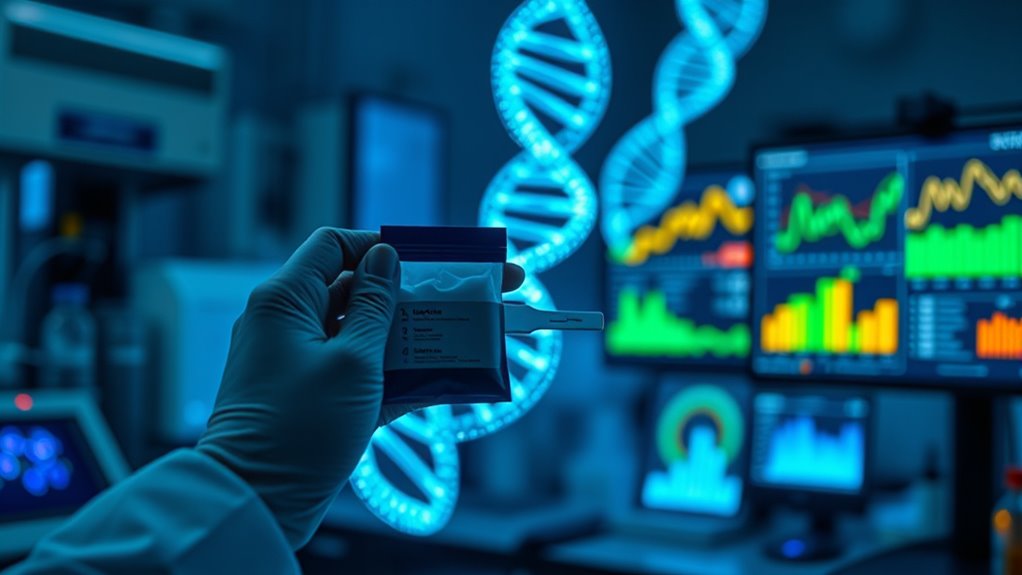
Recent developments in genetic testing have revolutionized how we comprehend individual nutritional needs. Today, gene therapy and epigenetic modifications help identify specific nutrient requirements and tailor interventions. Advanced tests analyze DNA variants linked to nutrient absorption, metabolism, and deficiencies. These insights enable personalized diets and targeted treatments, optimizing health outcomes. For example, tests can reveal how epigenetic changes affect gene expression related to nutrient utilization. Additionally, emerging techniques are exploring gene therapy’s potential to correct deficiencies at the genetic level. Here’s a quick overview:
| Technique | Focus Area | Impact |
|---|---|---|
| Genetic testing | Nutrient metabolism | Personalized nutrition plans |
| Epigenetic analysis | Gene expression regulation | Better understanding of nutrient needs |
| Gene therapy | Correcting genetic deficiencies | Potential future treatments |
| Advanced screening | Detecting genetic variants | Early and precise interventions |
Furthermore, understanding the beauty hours today list can help optimize scheduling for health and wellness routines.
Practical Applications of Nutrigenomics in Daily Life

You can use genetic testing to create diet plans tailored specifically to your needs, helping you reach your health goals more effectively. These personalized strategies can identify which nutrients your body processes best and which to limit. By understanding your genetic makeup, you gain practical benefits that make daily nutrition more efficient and targeted.
Personalized Diet Strategies
Personalized diet strategies harness your genetic information to optimize health and nutrition, making everyday eating more effective and tailored to your unique needs. Your genetic predisposition influences how your body processes nutrients, affecting your risk for certain health conditions and nutrient deficiencies. By understanding these genetic traits, you can adjust your diet to better support your well-being. Nutritional epigenetics adds another layer, showing how your food choices can modify gene expression without changing DNA. For example, incorporating specific nutrients can turn genes on or off to promote better health outcomes. These strategies empower you to make informed decisions, aligning your diet with your genetic makeup for improved energy, immunity, and disease prevention. Additionally, understanding tanning bed risks can help you protect your skin while still enjoying outdoor activities. This personalized approach ensures your nutritional plan is both scientifically grounded and uniquely suited to you, emphasizing the importance of mindfulness in maintaining overall health and well-being.
Genetic Testing Benefits
Genetic testing offers practical insights that can directly improve your daily health and nutrition choices. By understanding your genetic makeup, you can make informed decisions about diet, exercise, and supplements. Here are three key benefits:
- Personalized Nutrition Plans: Tailor your diet based on genetic predispositions, optimizing nutrient absorption and reducing health risks. Recognizing specific nutritional needs can help prevent deficiencies and support overall wellness.
- Genetic Counseling: Consult professionals to interpret your results, helping you understand potential health implications and preventive strategies.
- Gene Editing Opportunities: In some cases, genetic testing can identify candidates for emerging gene editing therapies to correct specific genetic variants, enhancing overall well-being.
These advancements empower you to take control of your health while working with experts to implement the most effective, science-based strategies, including home decor solutions that create conducive environments for healthy living.
Challenges and Ethical Considerations in Nutrigenomics
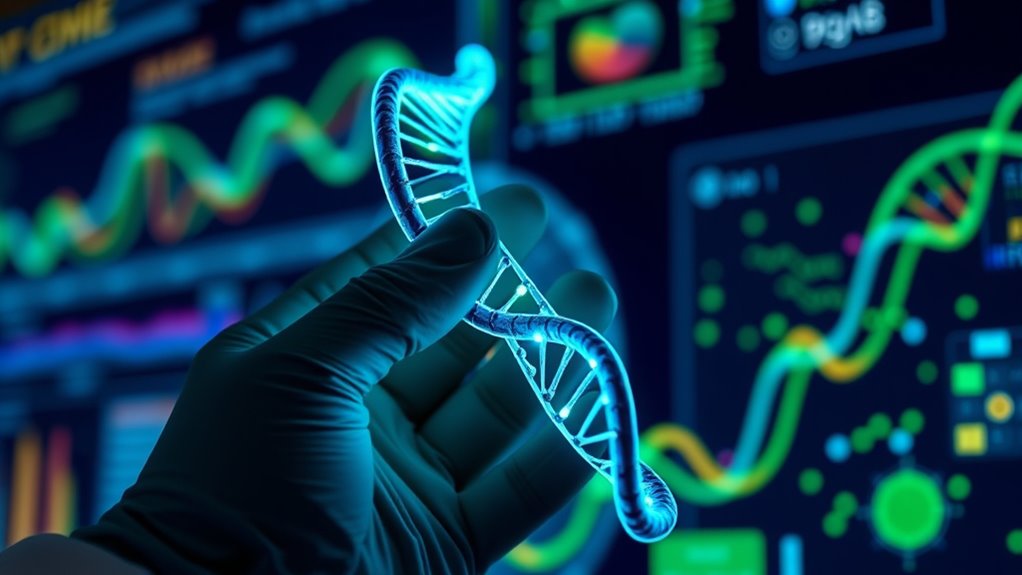
Despite the promising potential of nutrigenomics to tailor diets for improved health, it faces significant challenges and ethical concerns. Privacy concerns are at the forefront, as sensitive genetic information could be misused or exposed without consent. You need to be aware that sharing your genetic data raises questions about who owns this information and how it’s protected. Ethical dilemmas also arise around informed consent and potential discrimination based on genetic traits. You might worry about how your data could influence employment, insurance, or social treatment if mishandled. Furthermore, the rapid advancement of technology pushes ethical boundaries, forcing you to consider whether the benefits outweigh the risks. Addressing these challenges requires careful regulation, transparency, and a focus on protecting individual rights.
Future Perspectives in Genetic-Based Dietary Guidance
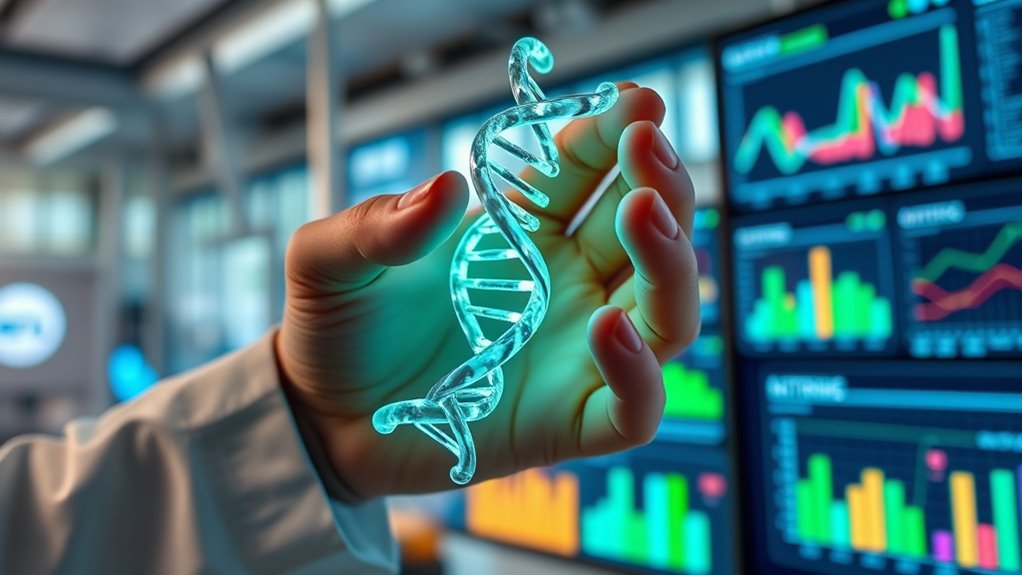
As research in nutrigenomics advances, the future of genetic-based dietary guidance looks increasingly promising, offering the potential to optimize health outcomes on an individual level. You could soon benefit from:
- Personalized nutritional plans informed by genetic counseling, helping you make smarter dietary choices based on your unique DNA.
- Integration of nutritional epigenetics, which considers how lifestyle and diet influence gene expression, guiding you to adopt habits that promote long-term health.
- More accessible genetic testing, enabling you to understand nutrient needs and risks without extensive medical visits.
These developments will empower you to take control of your health, tailoring your diet to your genetic profile and epigenetic factors for better disease prevention and wellness.
Incorporating Nutrigenomic Data Into Health Strategies
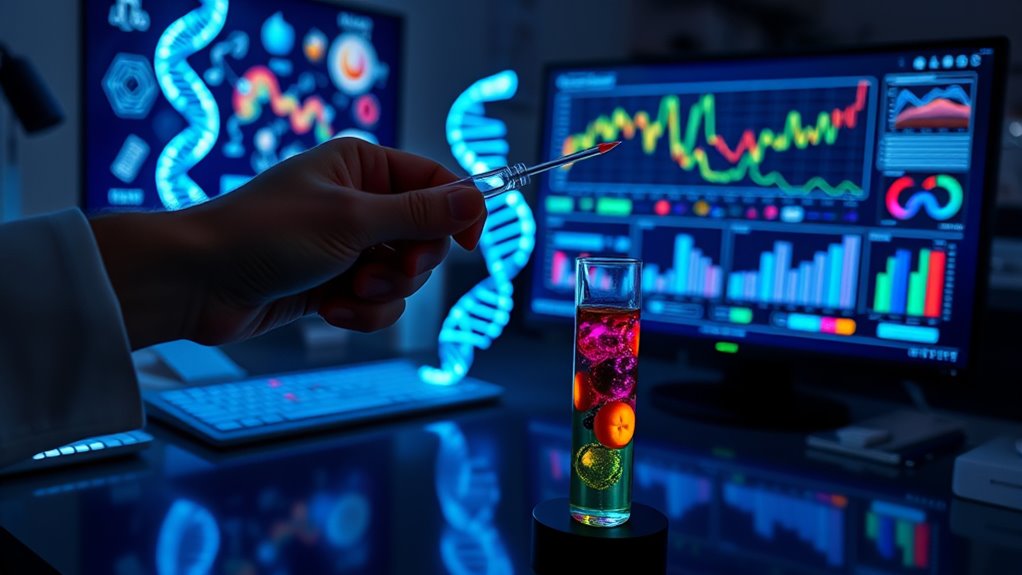
Integrating nutrigenomic data into health strategies allows for more precise and effective approaches to disease prevention and management. By understanding your genetic predispositions, you can tailor diets to reduce risks and address nutritional deficiencies directly. For example, if your genes indicate a higher likelihood of vitamin D deficiency, you can focus on supplementation or fortified foods. This personalized approach helps optimize health outcomes by targeting your specific needs. Use the table below to visualize how genetic insights can guide dietary choices:
| Genetic Predispositions | Nutritional Deficiencies |
|---|---|
| Increased disease risk | Focused supplementation |
| Metabolic variations | Customized nutrient intake |
| Absorption issues | Dietary adjustments for deficiencies |
| Enzymatic activity | Food choices to enhance digestion |
Frequently Asked Questions
Can Nutrigenomics Predict Individual Disease Risks Based on Diet?
You might wonder if diet can reveal your disease risks. While genetic predispositions play a role, nutrigenomics can help identify how your genes respond to certain foods. This knowledge allows for personalized dietary interventions that may reduce your risk of conditions like heart disease or diabetes. Keep in mind, though, it’s not a crystal ball—it’s a tool to guide smarter, tailored choices for better health outcomes.
How Affordable Is Genetic Testing for Personalized Nutrition?
Genetic testing for personalized nutrition varies in cost, making it more accessible than ever. You’ll find a wide cost comparison among different providers, often ranging from affordable direct-to-consumer options to more extensive tests. Testing accessibility has increased with online services and local clinics offering easier options. While some tests are budget-friendly, others can be pricier, but overall, more people can now explore genetic insights without breaking the bank.
Are There Risks of Genetic Data Misuse in Nutrigenomics?
Imagine your genetic data as a treasure chest—you wouldn’t want it to fall into the wrong hands. Yes, there are risks of genetic data misuse in nutrigenomics, especially concerning genetic privacy and data security. You should be cautious about who accesses your information and how it’s stored. Protecting your genetic details guarantees your personalized health journey remains private and secure, giving you control over your most sensitive information.
How Often Should One Update Their Genetic Nutritional Profile?
You should update your genetic nutritional profile periodically, ideally every 1-2 years, to account for genetic stability and new research findings. Regular updates help guarantee personalized recommendations stay accurate. Be mindful of data privacy; share your genetic info only with trusted sources. Advances in technology and understanding mean your genetic data could change in interpretation, not in your DNA, so staying current helps optimize your health and nutrition strategies effectively.
Can Lifestyle Changes Override Genetic Influences on Nutrient Needs?
You might wonder if lifestyle changes can override genetic influences on nutrient needs. While gene modification isn’t a typical approach, adopting healthy habits through nutritional therapy can notably impact your nutrient requirements. By improving diet, managing stress, and exercising, you can sometimes compensate for genetic predispositions. These lifestyle adjustments can help optimize your health, but they don’t completely change your genes. Instead, they work alongside your genetics to support better nutrient balance.
Conclusion
Imagine revealing your unique nutritional blueprint with your genes. While some claim nutrigenomics holds all the answers, science is still uncovering its full potential. It’s tempting to think your DNA can perfectly guide your diet, but remember, genetics is just one piece of the puzzle. Stay curious and informed—embrace personalized nutrition as a powerful tool, but don’t forget the importance of balanced habits and ongoing research. Your genes may hold secrets, but your choices shape your health.
